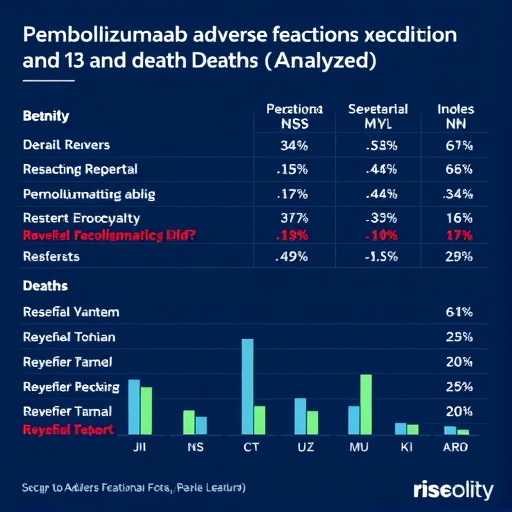Unveiling the Risks: A Retrospective Dive into Pembrolizumab-Related Adverse Reactions via FAERS Database
In the evolving landscape of cancer therapeutics, immune checkpoint inhibitors have revolutionized patient outcomes, with Pembrolizumab standing at the forefront of these breakthroughs. However, as its widespread clinical application expands, understanding the spectrum of adverse reactions it triggers becomes imperative. A recent comprehensive study drawn from the U.S. FDA’s Adverse Event Reporting System (FAERS) database sheds critical light on the nature, frequency, and fatality risk factors associated with Pembrolizumab-related adverse events, revealing insights that may transform patient monitoring and safety protocols moving forward.
Pembrolizumab, a programmed death-1 (PD-1) inhibitor, functions by unleashing the immune system to attack malignant cells, an approach proving remarkably effective across various cancer types. Yet, its immune-mediated mechanism underpins a complexity of adverse reactions, ranging from mild toxicities to severe, even fatal, immune-related events. With over 46,000 adverse reaction reports from 2013 to mid-2024 analyzed, the study leverages a massive real-world dataset to identify patterns that randomized controlled trials may have overlooked.
The temporal trends observed are notable, showing a steady increase in reported adverse reactions since Pembrolizumab’s introduction, surging dramatically in 2022 and 2023. This escalation likely reflects both the drug’s expanding indications and heightened vigilance in adverse event reporting. The geographic distribution reveals the United States and Japan as leading sources of these reports, highlighting disparities in drug utilization and pharmacovigilance infrastructure across regions.
Delving deeper, the analysis stratifies adverse events by patient demographics, revealing age as a pivotal factor influencing the severity and fatality of reactions. Specifically, the elderly population, those aged 65 and above, exhibited a disproportionate concentration of fatal outcomes. This finding aligns with established knowledge on immunosenescence and comorbid burden, suggesting that aging immune systems may simultaneously amplify drug toxicity and diminish resilience to adverse effects.
Gender also emerged as a statistically significant variable affecting treatment duration and outcome, with an odds ratio indicative of differential susceptibility or reporting biases between male and female patients. The study’s multivariate logistic regression models confirm that the number of active ingredients a patient receives correlates with fatal outcomes, underscoring the compounding risks associated with polypharmacy in cancer care.
Furthermore, the median time to adverse event-related death was remarkably short, averaging just seventeen days post-treatment initiation. This rapid onset emphasizes the critical window in which clinicians must exercise heightened vigilance and possibly reevaluate the risk-benefit calculus for vulnerable patients. Immune-related adverse events (irAEs), known for their unpredictable onset and severity, demand proactive management strategies, especially in high-risk cohorts.
Cancer type also shapes the adverse reaction profile. Although the study refrains from detailing all malignancies examined, it implies that tumor-specific factors may modulate immune responses or drug metabolism, altering the risk landscape. These findings provide impetus for personalized risk assessment protocols integrating tumor biology, patient demographics, and treatment regimens.
The role of reporter type in adverse event documentation proved significant, with healthcare professionals, patients, and pharmaceutical stakeholders contributing data. This multiplicity enriches the dataset but also introduces heterogeneity that researchers must account for when interpreting findings. Nonetheless, the sheer volume of reports strengthens the study’s validity, painting a robust picture of Pembrolizumab’s safety profile in real-world settings.
Clinical implications of these revelations are profound. The pronounced vulnerability of elderly patients urges oncologists to tailor treatment plans with enhanced monitoring, dose modifications, or alternative therapies where appropriate. Moreover, the association between polypharmacy and fatal outcomes calls for meticulous medication reviews to minimize drug-drug interactions and cumulative toxicities.
Immunotherapy’s promise is undeniable, yet its management necessitates a delicate balance between efficacy and safety. This study’s insights advocate for integrating FAERS-based pharmacovigilance data into clinical decision-making frameworks, promoting dynamic risk stratification throughout the therapeutic journey. Leveraging electronic health records and predictive analytics could further refine monitoring efforts, potentially preempting lethal complications.
The study also underscores the importance of continuous data collection and analysis as the therapeutic landscape and patient populations evolve. Post-marketing surveillance such as this serves as an indispensable complement to controlled trials, capturing the complexities of diverse, comorbid, and often frail cancer populations excluded from initial investigations.
Interpretation of odds ratios relating to gender and age points towards underlying biological and sociocultural factors influencing treatment outcomes. Future research exploring genetic predispositions, hormonal influences, and reporting behaviors may elucidate these associations more fully, enabling more nuanced patient counseling.
In summary, the retrospective FAERS database analysis illuminates critical patterns in Pembrolizumab-related adverse reactions, emphasizing age, gender, and polypharmacy as significant risk modifiers. It calls for heightened clinical awareness and tailored management strategies to mitigate fatal outcomes, particularly among the elderly. As immunotherapies continue to redefine oncology treatment paradigms, integrating real-world safety data will be paramount to optimizing patient outcomes.
This investigation not only enriches our understanding of Pembrolizumab’s risk profiles but also exemplifies the power of large-scale pharmacovigilance databases to inform evidence-based oncology practice. Ongoing vigilance, patient education, and interdisciplinary collaboration will be key to harnessing the full potential of these innovative therapies while safeguarding patient health.
Subject of Research: Pembrolizumab-related adverse reactions and fatality risk factors in cancer patients based on FAERS database analysis.
Article Title: Retrospective analysis of pembrolizumab-related adverse reactions and death outcomes based on the FAERS database
Article References:
Xu, H., Huang, Y., Zhao, N. et al. Retrospective analysis of pembrolizumab-related adverse reactions and death outcomes based on the FAERS database. BMC Cancer 25, 917 (2025). https://doi.org/10.1186/s12885-025-14342-2
Image Credits: Scienmag.com




